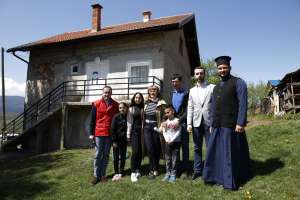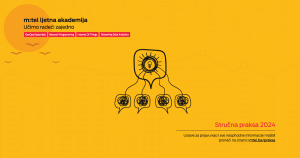SARAJEVO, March 9 (FENA) - Speaker of the House of Peoples of the Parliamentary Assembly of Bosnia and Herzegovina and President of the Party of Democratic Action (SDA) Bakir Izetbegovic said today in an interview with FENA that the statement on joint appearance of pro-Bosnian parties in the Republika Srpska entity is very important and it will produce certain concrete effects.
On March 1, the presidents of several parties and representatives of the institutions signed a statement on the position of returnees to the BiH entity of Republika Srpska (RS), and especially to Srebrenica.
“This is a coordination that has not been done so far, and a joint effort could really help Bosniaks and Croats in the RS, but also Serbs in the Federation of BiH. There is no politics, rivalry and parties when it comes to returnees,” Izetbegović thinks.
He reminded that the SDA has repeatedly called for the adoption of reintegration laws that would enable the implementation of Annex VII of the Dayton Peace Agreement to be completed in the next ten years and that those who want to return to their pre-war places of residence are able to and that they are provided with jobs.
However, there was no understanding for that, and they also requested that a certain percentage be allocated from the budget of the Federation of BiH for that purpose, as it is done when the international debt is returned in order to know that the money is allocated for those purposes.
“We have now signed that between 0.2 and two percent will be allocated for that purpose at all levels. In the Federation, a fixed one or 1.5 percent should be allocated, which would be the sum of 50 to 100 million KM per year, or 500 million to a billion in ten years, and funds will be provided to make concrete plans,” Izetbegović underlined.
The signed statement also specifies the joint participation at the elections, because during the election process, "scattering" of votes is evident, some parties get 800 votes, and 900 are needed to win a seat in the National Assembly of the Republika Srpska.
President of the Social Democratic Party (SDP), Nermin Nikšić, rejected to sign the statement, but Izetbegović said it should not jeopardize the goals or harm the entire initiative, as SDP does not have the political strength to make it happen.
“I am surprised by the persistent relation in which the SDP proves multiethnicity in a completely wrong way. That should not be done to Bosniaks in Republika Srpska, of whom there are 13 percent, and one percent of them are in institutions. They are struggling to call their language Bosnian. This is not something we should disagree with the SDP,” Izetbegović emphasized.
However, he says that it is not late for SDP to change its decision and called on them to think about everything once again and protect people who are really in a difficult situation because "Bosniaks in RS are 30th-class citizens, not second-class citizens". Therefore, political points should not be collected on that, especially after the gaffe that SDP experienced in Srebrenica.
SDA President Bakir Izetbegović commented on the coronavirus pandemic as well and the fact that Bosnia and Herzegovina has not yet received vaccines for immunization of the population, emphasizing that the COVAX mechanism on which BiH relied, but also the sluggish Council of Ministers of BiH that did not react in time, which may have been the goal for some in order for RS to get vaccines faster.
He underlined that the COVAX mechanism acted very well at the beginning, putting BiH on waiting lists, which is why vaccines were expected to arrive in January, but the fairness of vaccine distribution was especially good, where it was said that either everyone would get vaccines or no one would.
“But then when some countries made an impact, the vaccines reserved for BiH and some other less influential countries went to the richer and more influential ones, that COVAX, which is at the World Health Organization and the United Nations, allowed it,” Izetbegović pointed out.
But BiH's response was not good either, it was clumsy and slow, Izetbegović added, because COVAX waited until January when it was supposed to deliver vaccines to ask BiH for new guarantees, which they did on purpose because they redirected vaccines to other places.
However, even when that happened, additional guarantees should have been sent in one day, and not as the Minister of Civil Affairs of BiH Ankica Gudeljevic (HDZ BiH) did, asking for the consent of the entities that was not necessary.
Therefore, he says, the responsibility for not procuring vaccines is in bad organization, and at that time the Federation of BiH expected that all the work would be completed by the state, and if they admitted in time that they would not do it, the FBiH would do things differently.
He announced that after yesterday's decisions of the Government of the Federation of BiH, that issue will be resolved in the Federation of BiH in the next few days.
In this regard, he referred to the fact that the House of Peoples of the Parliamentary Assembly of BiH did not adopt amendments to the Law on Public Procurement and the Law on Medicines and Medical Devices that would facilitate the procurement of vaccines because there was not enough support from Republika Srpska. He explained that some believe that it is not necessary to change the laws for procurement and that it is possible to procure vaccines by shortened deadlines.
Izetbegović believes that some things could still be agreed with SNSD because they are interested in the state not imposing itself as someone who can hinder the entity in procurement.
“That is not our goal. Our goal is for the state to help every level of government to achieve that. We will give up some things that are disputable to them in order to relax things, because after the problems related to the procurement of ventilators, the reaction is slow,” Izetbegović explained.
Izetbegović states that in the health and economic sense, BiH did not respond badly to the pandemic at all.
“If someone had asked us last year whether we would be satisfied if BiH was the best in the region and above the average in the European Union when it comes to spread of the virus and that the decline in gross domestic product was immediately behind Serbia and smaller than all others in the region, we would say that it will be good if that is the case,” says Izetbegović.
He underlined that this is exactly the situation now that everything in BiH is around four percent, because four percent of population is infected with Covid-19, four percent are dead, and four percent is the fall in GDP, while the fall in the number of employees is about 2.7 percent and a 2.3 percent drop in indirect tax collection. In all this, BiH is significantly better than Slovenia, Croatia and Montenegro, as well as the average in the European Union.
BiH, he says, is far from a situation where there is no one to help the sick and that patients are placed in the corridors, and the only fear is that such a situation could be in Sarajevo where a large number of tourists have stayed in recent months, which is why the Sarajevo Canton is now in critical condition because we have hundreds of newly infected people every day.
Talks on amendments to the Election Law have started again, and delegations of SDA and HDZ recently held the meeting, but Izetbegović says that other parliamentary parties, legal experts and all other parties should be included in the whole process of amending the Election Law.
He says that from the beginning he was not in favor of a reduced format, which was insisted on by the representatives of the international community because they were guided by the opinion that Izetbegović and HDZ leader Dragan Čović managed to resolve the issue of elections in Mostar, and they are aware that if this knot in the Federation of BiH is untied, shifts can be expected.
He is of the opinion that everyone should be part of these negotiations, because the whole structure will not be able to establish an Inter-Ministerial Working Group to deal with these issues, let alone resolve issues that have not been resolved through the so-called "April package" and many other international community efforts.
He does not want these negotiations to collapse, but he expressed fear that this will happen soon because the positions between the SDA and the HDZ are too far apart. The SDA insists that the judgments of the European Court of Human Rights, which are based on the civil principle that every citizen can vote for whoever they want and run for every position in BiH, be implemented, which the HDZ does not want.
He announced that meetings of working groups would be organized in the coming days, but Izetbegović believes that they are getting closer to the moment when it will be said that unfortunately the attempts to amend the Election Law might fail because the positions are too far away, unless HDZ shows more willingness to compromise.
“We are all dissatisfied with the Dayton structure. We are frustrated that one party can stop whatever it wants without explanation, not to form the FBiH Government, to appoint all members of the Constitutional Court, but that is not the case in RS,” says Izetbegović.
If the HDZ, he notes, is willing to create a similar system in the House of Peoples of the FBiH Parliament as it is in the Council of Peoples of the RS and which protects only vital national interests and thus free the will of the majority from the House of Representatives, then there will be chances take a step forward.
Two and a half years have passed since the elections and the new FBiH Government has not been formed yet, but Izetbegović says that there will be no continuation of any negotiations unless steps are taken in that direction and a new FBiH Government is appointed, President and Deputy Presidents of the Federation of BiH are appointed, for which Izetbegović is not sure that there are enough votes in the FBiH Parliament.
In the part of the opposition, every activity towards BiH's NATO path is interpreted as giving up membership in this organization, i.e. as a step backwards, but SDA leader Bakir Izetbegović says that BiH is moving forward in that sense, but not very fast.
It is being done in accordance with the adopted strategies, laws and decisions of the Presidency of BiH regarding BiH's path to NATO membership, and Izetbegović emphasizes that BiH is part of the Membership Action Plan (MAP), which was underlined by NATO Secretary General Jens Stoltenberg.
Stoltenberg underlined that, unlike Serbia, which is in the Partnership for Peace, BiH has other ambitions that will be supported, says Izetbegović, and concludes that BiH is on a slower path than he would like it to be.
(FENA) A. B.









